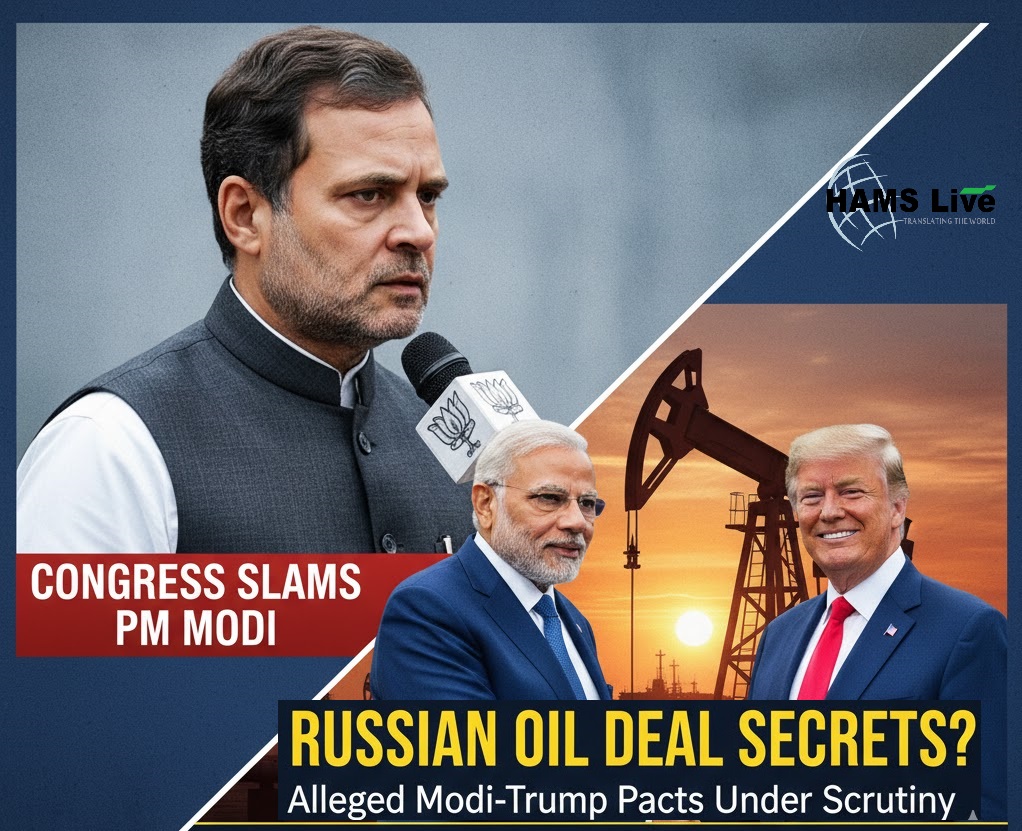Congress Criticizes PM Modi Over Alleged Commitments to Trump Regarding Russian Oil Purchases
In a surprising turn of events, a statement made by U.S. President Donald Trump has ignited fierce political debate in India. Trump claimed that Prime Minister Narendra Modi assured him that India would halt its purchases of Russian oil, a statement that has left many questioning the Prime Minister’s independence in foreign policy. The political opposition, particularly members of the Congress party, have accused Modi of being overly subservient to Trump, asserting that the Prime Minister is allowing the U.S. President to dictate India’s international relations.
The confrontation arose from comments made by Trump during a press briefing, where he stated, “He assured me today that they will not be buying oil from Russia. That’s a big step.” This assertion is significant as it touches upon India’s energy needs, which are heavily reliant on Russian oil, particularly in light of the ongoing conflict in Ukraine. It also raises questions about Modi’s approach to foreign policy and whether India is willing to align its decisions to please Western leaders.
In a swift reaction, Rahul Gandhi, Congress’s Leader of Opposition, denounced the Prime Minister’s alleged capitulation to Trump. He criticized Modi for several of his actions, including sending congratulatory messages to Trump, cancelling the Finance Minister’s visit to the U.S., and notably, skipping the Gaza Peace Summit held in Egypt. Gandhi’s remarks suggest a growing concern within the opposition about Modi’s diplomatic strategy and relationship with the United States.
The importance of this issue lies not only in the bilateral relations between India and the U.S. but also in the broader context of India’s energy security and its historical ties with Russia. For decades, India has maintained a robust energy relationship with Russia, which has become increasingly critical in the current geopolitical climate shaped by energy shortages and rising prices.
Political Reactions to Trump’s Claim
The response from Indian politicians ranges from ridicule to serious concern. Shiv Sena MP Priyanka Chaturvedi expressed her frustration at the government’s silence regarding Trump’s claims. She emphasized the need to dispel what she termed Trump’s “delusions,” which she believes could misrepresent the true state of affairs in Indian foreign policy. Chaturvedi pointed to past instances where Trump made inflated claims about U.S. involvement in South Asia, including an assertion that he had brokered a ceasefire between India and Pakistan during a recent period of heightened tensions.
Chaturvedi’s comments about Trump’s influence underscore a critical point: the relationship between India and the United States is fraught with complex dynamics. The Congress party’s reaction suggests that there may be a broader fear about a potential compromise of India’s sovereignty in foreign affairs.
Moreover, this incident comes at a time when India has been asserting its position on the global stage, seeking to maintain a non-aligned stance while navigating pressures from both Western allies and traditional partners like Russia. The long-standing ties between Russia and India complicate this narrative further, with energy demands serving as a focal point for diplomatic hurdles.
India’s Stance on Energy Security and Foreign Policy
Historically, India has been steadfast in its quest for energy security, often relying on a diverse portfolio that includes significant imports of oil and gas from Russia. India has consistently maintained that it would not compromise its energy needs, especially as it grapples with a growing population and an expanding economy. The question of whether India will heed Trump’s reported request remains open, particularly since official channels in New Delhi have not corroborated Trump’s statement.
The Indian government’s reticence to publicly affirm or deny Trump’s assertion has led to increased scrutiny of its foreign policy decisions. Critics argue that India’s diplomatic strategy should prioritize national interests over external pressures. The current global energy crisis exacerbated by the conflict in Ukraine only amplifies these concerns, as countries worldwide scramble for reliable energy supplies.
In light of this political drama, Gandhi’s accusations against Modi have raised the stakes, suggesting that the Prime Minister’s handling of foreign relations, particularly regarding energy imports, could define his legacy. The opposition appears keen to capitalize on any perceived weakness in Modi’s leadership, particularly in relation to significant foreign policy decisions that could affect India’s position on the international stage.
Broader Implications of the Discourse
As this political narrative unfolds, its implications extend beyond mere partisan squabbles. How India responds to Trump’s statements and the underlying geopolitical dynamics will be critical in shaping its future interactions with both the United States and Russia. The ongoing tensions between these two powers amid a shifting global order will undoubtedly influence India’s balancing act in maintaining its autonomy while navigating international expectations.
The upcoming months will be crucial as India navigates its energy landscape while responding to external pressures. How Modi’s administration portrays its stance on Russian oil purchases could very well resonate within the broader context of India’s foreign policy and its role in global affairs.
Political analysts will be observing whether Modi’s government can rally behind a clear and independent foreign policy stance that reflects India’s interests without yielding to external pressures. This event serves as a reminder of the delicate balance that must be maintained in a multipolar world, where relationships with major powers can have profound effects on national policy.
What remains to be seen is how the Indian government plans to navigate the complexities of its energy needs amidst international expectations, and whether they will opt to reaffirm India’s sovereignty in their foreign policy decisions moving forward.


